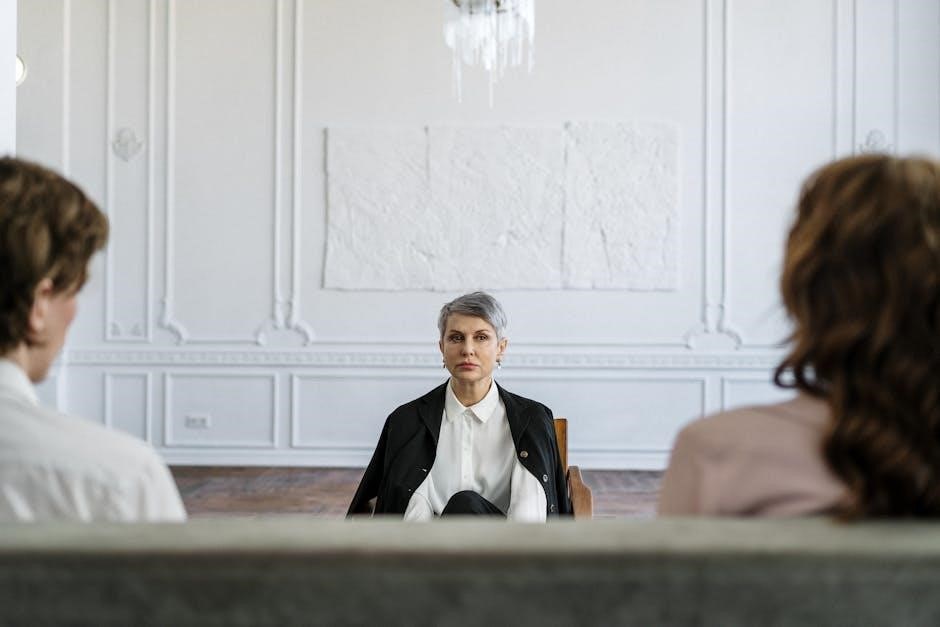Carl Jung’s Modern Man in Search of a Soul explores the spiritual crisis of the 20th century, blending psychoanalysis, dream interpretation, and the search for meaning in a modern world․
Overview of the Book
Modern Man in Search of a Soul is a collection of essays by Carl Jung, first published in 1933․ The book provides an accessible introduction to Jung’s psychological theories, exploring themes like psychotherapy, dream analysis, and the spiritual challenges of modern life․ It discusses the tension between science and religion, the concept of the collective unconscious, and the process of individuation․ Written for a broad audience, it remains a foundational text for understanding Jung’s ideas and their relevance to the human condition in the 20th century․

Significance of the Title

The title Modern Man in Search of a Soul reflects Jung’s concern with the spiritual emptiness of modern life․ It highlights the disconnect between scientific progress and inner fulfillment, emphasizing man’s quest for meaning and transcendence․ The title encapsulates Jung’s belief that modern individuals must reconcile their rational, materialistic worldview with their deeper, spiritual needs․ This duality is central to Jung’s philosophy, making the title a powerful metaphor for the human condition in the 20th century and beyond․
Carl Jung’s Contribution to Psychology
Carl Jung revolutionized psychology by introducing concepts like the collective unconscious, archetypes, and individuation․ His work bridged psychoanalysis with spirituality, emphasizing the integration of opposites․ Jung’s theories on personality types and dream analysis remain foundational․ By breaking from Freud, he established analytical psychology, offering a holistic view of the psyche․ His ideas have profoundly influenced fields beyond psychology, shaping modern thought on identity, spirituality, and personal growth, making him one of the most influential thinkers of the 20th century․

The Concept of the Soul in Modern Times
In modern times, the soul is often seen as a bridge between the conscious and unconscious, reflecting humanity’s quest for meaning and integration in a fragmented world․
Historical Perspectives on the Soul
Historically, the soul has been viewed as a divine essence, often tied to religious and philosophical frameworks․ Ancient cultures and religious traditions emphasized the soul as immortal and sacred․ In modern times, psychological perspectives, influenced by thinkers like Jung, explore the soul as a symbol of inner wholeness and balance․ This evolution reflects humanity’s enduring quest to understand its spiritual and existential nature, bridging the gap between ancient beliefs and contemporary psychological insights․ The concept remains central to discussions of identity and purpose․
The Spiritual Crisis of the 20th Century
The 20th century witnessed a profound spiritual crisis, marked by a growing sense of alienation and disillusionment․ Industrialization and scientific progress eroded traditional religious beliefs, leaving modern man disconnected from spiritual meaning․ Carl Jung observed this crisis as a response to the dehumanizing effects of modernity, where individuals lost touch with their inner selves․ The decline of religious authority and the rise of materialism exacerbated this sense of emptiness, prompting a search for new sources of meaning and purpose․ Jung’s work addresses this crisis by emphasizing the need for psychological and spiritual balance․
Jung’s Definition of the Soul
Carl Jung viewed the soul as a central concept in his psychology, representing the deepest, most essential part of the human psyche․ He defined the soul as the bridge between the conscious and unconscious mind, where the process of individuation occurs․ Jung believed the soul is not just a religious concept but a psychological reality, essential for achieving balance and wholeness․ Through the soul, individuals connect with universal symbols, or archetypes, facilitating self-realization and spiritual growth․ This concept remains pivotal in understanding Jung’s vision of human transformation and inner harmony․

The Causes of Spiritual Disillusionment
The decline of religious beliefs and the rise of materialism have led to a sense of emptiness, disconnecting modern individuals from their spiritual roots and inner truths․
The Impact of Industrialization
Industrialization brought unprecedented technological progress but also led to alienation and disconnection from meaningful experiences․ The shift from rural to urban life disrupted traditional communities, fostering a sense of isolation․ Mass production and consumerism prioritized material gain over spiritual fulfillment, leaving individuals feeling empty and unfulfilled․ Jung highlights how industrialization eroded the sense of purpose and connection to the soul, contributing to modern man’s existential crisis․ This societal transformation reshaped values, pushing humanity further from its spiritual roots and deeper into disillusionment․
The Decline of Religious Beliefs
The decline of religious beliefs in the modern era has left a spiritual void, contributing to man’s sense of disorientation․ Rationalism and scientific advancements have diminished the role of religion, leading to a disconnect from traditional spiritual frameworks․ Jung observed that as religious dogma lost its hold, individuals struggled to find meaning, turning to materialism or intellectualism as substitutes․ This spiritual emptiness has driven modern man to seek alternative paths to fulfill his inner longing for connection and purpose, highlighting the need for a deeper understanding of the soul․
The Rise of Materialism
The rise of materialism has become a defining feature of modern life, with individuals increasingly prioritizing wealth and possessions over spiritual fulfillment․ This shift has led to a sense of alienation, as people seek meaning in external possessions rather than inner growth․ Jung critiques this trend, arguing that materialism distracts from the deeper, universal human quest for purpose and connection․ The pursuit of material gain has created a void, leaving modern man disenchanted and disconnected from his soul, exacerbating the spiritual crisis of the 20th century․
Jung’s Theory of the Collective Unconscious
Jung’s theory proposes a shared psychological reservoir, the collective unconscious, containing universal archetypes that influence human thought and behavior across cultures and time, guiding modern man’s soul-searching journey․
Archetypes and Their Role in Human Psyche
Archetypes, universal symbols and images, reside in the collective unconscious, influencing human thought and emotion․ They appear across cultures, such as the Mother or Hero, guiding psychological development․ Jung believed archetypes like the Persona and Shadow aid individuation, helping modern man integrate opposites and achieve wholeness․ These inherited patterns bridge the conscious and collective unconscious, offering a shared psychological foundation․ Their presence in dreams and myths highlights their timeless relevance, shaping modern man’s soul-searching journey in a fragmented world․
The Process of Individuation

Individuation is Jung’s central concept, describing the integration of opposites—conscious and unconscious, rational and emotional—to form a whole personality․ This process, essential for modern man’s soul-searching, involves self-awareness and overcoming internal conflicts․ By unifying the psyche, individuals achieve psychological balance and fulfillment․ Jung emphasized that individuation is a lifelong journey, crucial for personal growth and spiritual harmony in a fragmented world․ It bridges the gap between the individual and the collective unconscious, fostering a deeper understanding of the self․
Critique of Modern Society
Jung critiques modern society’s focus on materialism and science, highlighting its alienating effects and the loss of spiritual meaning in industrialized life․
The Alienation of Modern Man
Jung identifies alienation as a pervasive issue in modern society, stemming from the disconnect between industrial progress and spiritual fulfillment․ As scientific advancements and materialism dominate, individuals lose touch with their inner selves and collective unconscious․ This estrangement fosters feelings of isolation, disorientation, and existential despair, reflecting a broader societal crisis․ Jung argues that modern man’s relentless pursuit of rationality and efficiency has eroded meaningful connections to tradition, nature, and the soul, leaving him fragmented and unfulfilled in a chaotic world․

The Role of Science and Technology
Science and technology have profoundly shaped modern life, offering unprecedented advancements but also contributing to spiritual disorientation․ Jung critiques the over-reliance on rationality and empirical data, which often overshadow deeper, soulful dimensions of human existence․ While these fields solve external problems, they leave inner emptiness unaddressed, fostering a sense of alienation and disconnection from meaning․ Jung argues that the dominance of science and technology exacerbates modern man’s spiritual crisis, highlighting the need for a balanced approach that integrates rational progress with inner, soulful exploration․

Dream Analysis and Its Significance
Dreams, according to Jung, reveal the unconscious mind’s hidden truths, offering insights into unresolved conflicts and desires․ They serve as a bridge to the soul, guiding self-discovery․
Jung’s Approach to Dream Interpretation
Jung viewed dreams as windows to the unconscious, emphasizing their role in revealing hidden truths about the self; Unlike Freud, he focused less on repressed desires and more on personal growth․ Jung’s method involved active imagination, encouraging individuals to engage with dream symbols to uncover their deeper meaning․ He believed dreams compensated for conscious attitudes, guiding the process of individuation․ By analyzing personal associations and archetypes, Jung’s approach aimed to integrate the unconscious with the conscious, fostering psychological wholeness and spiritual insight․
Dreams as a Path to the Soul
Jung believed dreams were a bridge between the conscious and unconscious mind, offering insights into the soul․ He emphasized their symbolic language, revealing hidden truths about the self․ By analyzing dreams, individuals could uncover repressed thoughts, desires, and unresolved conflicts, fostering self-awareness and growth․ Jung saw dreams as a natural path to psychological integration, guiding modern man toward spiritual renewal and a deeper connection with his inner self․
The Role of Religion in Modern Life
Religion remains vital for psychological balance, offering meaning in a rational age․ Jung saw it as essential for integrating the psyche, despite declining traditional beliefs․
The Tension Between Faith and Reason
The tension between faith and reason reflects modern man’s struggle to reconcile spirituality with scientific advancements․ Jung emphasized that both are essential for psychological wholeness, as they address different aspects of human experience․ Faith provides emotional and intuitive connections, while reason offers logical understanding․ However, their conflict often leads to inner division, as highlighted in Modern Man in Search of a Soul․ Jung argued that neglecting either dimension results in imbalance, hindering the integration of the psyche․
Jung’s Views on Christianity
Jung viewed Christianity as a system that once provided meaning but had become rigid and dogmatic․ He believed Christianity’s symbols, such as the cross, held deep psychological significance but were often misunderstood․ Jung criticized the Church for neglecting the individual’s inner experience and the unconscious, leading to spiritual alienation․ He advocated for a more personal, experiential faith, integrating the divine and the human psyche․ Jung saw Christianity as a potential path to wholeness but emphasized the need for reconnection with the soul․
Carl Jung’s insights remain relevant today, offering a bridge between spirituality and psychology․ His work continues to guide modern seekers in their quest for a meaningful life․
The Relevance of Jung’s Ideas Today
Carl Jung’s ideas in Modern Man in Search of a Soul remain timeless, offering insights into the human psyche and spiritual struggles․ His concepts of the collective unconscious and archetypes resonate with contemporary discussions on mental health and societal trends․ Jung’s emphasis on self-reflection and individuation provides a framework for navigating modern life’s complexities, such as the rise of technology and the decline of traditional beliefs․ His work continues to inspire those seeking meaning in a fast-paced, often fragmented world, making his theories as relevant today as they were in his time․

Final Thoughts on the Search for the Soul
Jung’s Modern Man in Search of a Soul offers a profound exploration of humanity’s quest for meaning․ By integrating the opposites—conscious and unconscious, rational and spiritual—Jung provides a pathway to wholeness․ His vision of the soul as a unifying force remains timeless, urging modern individuals to embrace their deeper selves․ The book’s enduring relevance lies in its ability to bridge psychology and spirituality, offering insights that continue to resonate in an increasingly fragmented world․ Jung’s work invites us to reclaim our souls in a journey toward self-discovery and fulfillment․
